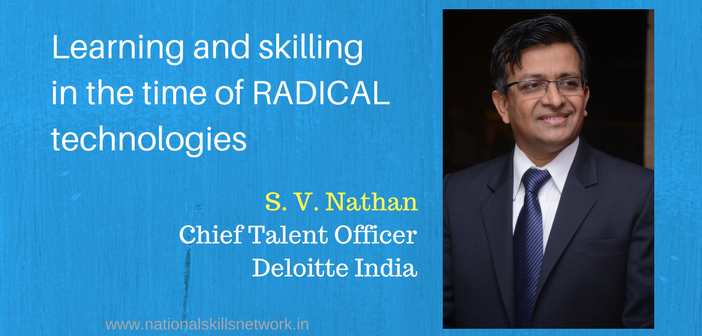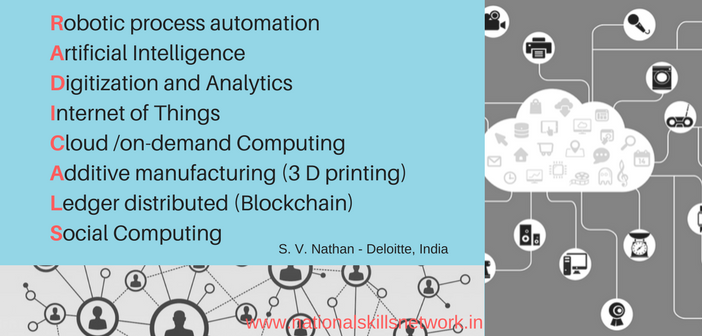We are delighted to present the first Skill Talk in the ‘Expert Speak’ Series that focuses on training and skill development, a critical function of the Human Resources (HR) teams . Our distinguished guest, Mr S V Nathan, Chief Talent Officer, Deloitte India, shares his perspective on the emerging landscape of technology transformation, layoffs and the need for continuous learning. Let’s read on to know more about the RADICAL technologies, as he conceptualizes them, and reflect on his insights on skills, training and employment in IT and ITeS industry.
 Let me start by saying that what the industry is undergoing today is quite normal and cyclical, a phase in its evolution. Downsizing and layoffs is not something unexpected. All the talk about Industry 4.0 has brought in a lot speculation and impending loss of jobs due Robotics, Automatic and so on. Actually, many don’t know what exactly they mean when they mention Industry 4.0. Since change is a constant, we need to prepare ourselves by learning to cope with it.
Let me start by saying that what the industry is undergoing today is quite normal and cyclical, a phase in its evolution. Downsizing and layoffs is not something unexpected. All the talk about Industry 4.0 has brought in a lot speculation and impending loss of jobs due Robotics, Automatic and so on. Actually, many don’t know what exactly they mean when they mention Industry 4.0. Since change is a constant, we need to prepare ourselves by learning to cope with it.
Continuous learning is of paramount importance as that is the lever for supporting anyone through the change. When we look at the past and understand how IT and ITeS industry has impacted jobs, we find similar instances. Remember the year 2000 and apprehensions around Y2K? On hindsight, we saw that these fears were misguided. It was not end of the world as it was made out to be. But, one important takeaway from this episode is how new roles came up in the industry and it led to massive skilling and re-skilling.
 Continuous learning and skill development in the perspective of industrial evolution
Continuous learning and skill development in the perspective of industrial evolution
I would like to describe the evolving industry with an acronym called technology RADICALS: R- Robotic process automation, A – Artificial Intelligence, D- Digitization and Analytics, I – Internet of Things, C – On -demand /Cloud Computing, A – Additive manufacturing (3 D printing), L – Distributed Ledger (Blockchains) ,S – Social Computing
 In all of these, there is an unmatched human potential, aided by unprecedented access to opportunities including capital in producing unimaginable technology and process breakthroughs. So, these technology RADICALS will fundamentally change the comparative landscape in all our industries. The challenge is to ensure that we embrace this change with right knowledge and skills and the right approach to learning.
In all of these, there is an unmatched human potential, aided by unprecedented access to opportunities including capital in producing unimaginable technology and process breakthroughs. So, these technology RADICALS will fundamentally change the comparative landscape in all our industries. The challenge is to ensure that we embrace this change with right knowledge and skills and the right approach to learning.
Robotics can take away only mundane jobs. This fear of job loss is similar to the phobia of computers taking away all the jobs during the early 1980’s when computerization was mandated across industries. When we look we see that more number of jobs were created through computerizations than ever in our entire history of several generations. Computerization, in fact, empowered us in many ways!
Going through the crests and troughs is quite a normal way of progression of things. Few decades ago it was the fear of computerization and today, we see another trough, which is not real but more of an imagined fear. The fear is fuelled by the fact that people will have to reengineer themselves. It is like how we learnt to wear seat belts in a country where people were completely unhabituated to this safety measure. Today, the moment you sit in the car, you get the beep to remind you about wearing the seat belt. Such gentle ways of prodding help in learning and adapting to new circumstances and situations.
So, how do you deal with Robotics? You deal with it by moving one notch higher. Apparently, Robotics hasn’t matured to the level of cognitive thinking but it can handle lots of disparate data and follow instructions. And ‘empathy’ is something that cannot be learnt as it is a lot about Emotional Intelligence, something which is very difficult for machines to learn. Look at Artificial Intelligence; the simple and mundane example is the prompts we get while we type or text. Many people find it useful. And then look at how banks have embraced digitization. Now, with Internet of Things (IOT), a tool like Fitbit can teach you how to run and be the best coach one can have!
The day is not far off when you have to deal with all of these. You need to get started with learning a lot of new things and this is what we are attempting today.
Our ability to adapt and adopt through learning
Our country is known the world over for its ability to adapt and adopt through learning. India was not an English speaking country when we got our independence. However, today we are one of the populous English speaking countries in the world. It is not just about speaking the language; it’s about what we are able to give to the world. We are known for our ability to adapt and learning has never been a problem.
The problem in our ability to scale up and be agile. It’s not that we didn’t know that jobs would be impacted; it’s more about our preparedness to face the situation. The people who worked helped Robotics and AI have all had Indians in their teams. You look at any leading company in the world; you will find an Indian behind it.
HR teams’ readiness and collaboration with the academia
The HR teams at this stage have to be ahead of the curve. We don’t have the luxury of reacting to situations at our own pace or convenience. We need to be proactive and be ready with the right training and development programs to meet the industry requirements.
One of the most important things in this area is as much as you do everything inside the company you should also plan to do something that is external to the firm. This means, the HR teams have to ensure that they work with the portals of knowledge such as undergrad colleges, technical and professional colleges that have almost 5.5 million youth enrolled in their courses. When the HR teams go for recruitments in these colleges they should try to understand the curriculum and open up channels of communication to discuss the courses and current skill levels.
Let me give you an example, when SAP trained candidates were in great demand, lots of engineering colleges in the countries spent time giving vocational training to people who were interested in SAP and got them certified. When these candidates joined the organization, they were work-ready. Similarly for any new software training, it can be embedded in the colleges if these portals of knowledge work proactively.
It is also important to work with the Government. For instance, the work being done by Telangana government is commendable in the field of skill development. Telangana Academy of Skill and Knowledge (TASK) has made pioneering efforts in bringing the industry and the academia together through relevant skilling programs. This has a huge positive impact on the state and for the city of Hyderabad and other districts to be in the forefront in the IT industry. They are working very closely with many colleges to ensure that the students are imparted current industry relevant knowledge and skills early on. We just have to find ways to partner with them and be ahead of the curve.













Nice information. Thanks